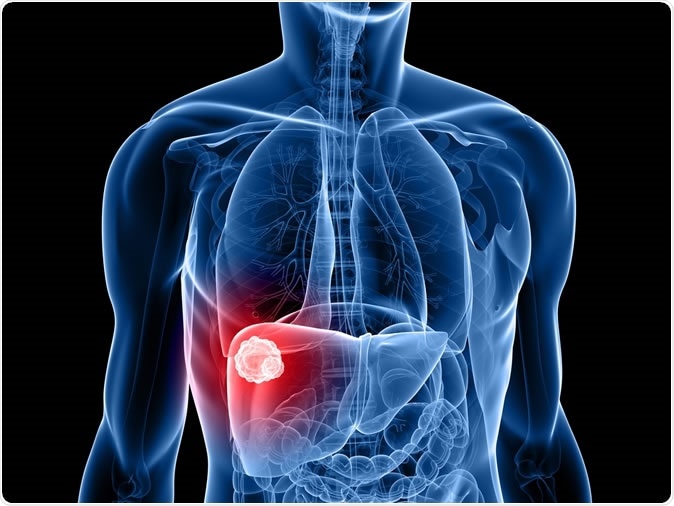Liver cancer is rapidly moving up the cancer killer ranks in England, according to a new study that is to be presented at the 201th NCRI Cancer Conference on November 2, 2019. Both the number of new cases and the mortality rate from hepatocellular carcinoma (HCC), have tripled, over the period from 1997 to 2016. HCC is the most common form of liver cancer. Moreover, a quarter of these cases occur among the least privileged fifth of society.

Liver cancer. Image Credit: Sebastian Kaulitzki / Shutterstock
The research was presented by cancer epidemiologist, Anya Burton, who works at Public Health England (PHE). It points out that with such a high rate of incidence, and with advanced cirrhosis of the liver in many of these patients, it is extremely difficult to treat them with any degree of success. Thus public health efforts need to focus on prevention as the route to control the disease. Such efforts must be broad-based to address liver disease in general, but must also target conditions which predispose to HCC in particular.
The data comes from the NCRAS (National Cancer Registration and Analysis Service), that is part of PHE. The NCRAS partnered with Hepatocellular Carcinoma UK (HCCUK) to create the current study. The part which is being presented now deals with cases in England alone, while the researchers are continuing to analyze data on the disease is other parts of the UK to produce a country-wide picture.
The current situation in England
Over the 20 years of the study period, there were over 62 000 cases of primary liver cancer, of which almost half (48%, or almost 30 000) were HCC in type. Another major chunk comprised intrahepatic cholangiocarcinoma (iCCA, 38%), with 14% being unspecified or rare liver tumors.
The data shows that not only have HCC rates tripled, but the proportion it bears to all types of liver cancer has also changed dramatically. With better tumor classification methods being followed at present, the altered pattern is quite apparent. Whereas in 1997 there was an approximately 1:1 ratio for HCC:iCCA, with 20% being unspecified tumors, now the ratio is more like 1.6:1. The average age of HCC patients at diagnosis was 68 years.
The increase was more shocking among men. The incidence in men was about 2.7 per 100 000 population in 1997, with almost 2 deaths/100 000. By 2016, incidence and death rates had become 8.8 and almost 6, per 100 000 population, respectively. For women, the rate of new cases had gone up from less than 1 to 2.2 per 100 000, and the death rate from 0.5 to 1.4 per 100 000, over the same period.
Risk factors for HCC
Burton explains that historically, there has always been a gap between men and women in the case of HCC, possibly because of different risk factors in both sexes. The present study confirms this, with over 77% of cases being found in males.
When they looked at the bottom fifth of the population with respect to their socioeconomic status, they found that a full 25% of cases were from this section, with about 58% having cirrhosis. In this latter group, about 42% had already gone into decompensated liver failure, where the liver is so scarred that it cannot function normally any more. The reasons for this trend were not analyzed. However, high drinking, use of drugs by injection, and obesity, are common risk factors, which are more common among poorer sections of society. Such an analysis remains in the future.
Prognosis for HCC
The report also showed that most HCC patients did not have any specific treatment plans. Surgical treatment is often impossible because it starts to spread outside the liver, early in its course. Moreover, the severe liver damage makes many forms of therapy dangerous, since they can cause more complications to occur, including liver failure. In early HCC, however, treatment by surgical extirpation, radiofrequency ablation, or liver transplantation, is possible.
The problem with early diagnosis is that liver cancer is insidious in its clinical onset, though aggressive in its growth. Most patients had been diagnosed after they presented to emergency or were referred by a GP, in 35% and 30% of cases respectively. In most cases they were diagnosed at an advanced stage, with less than half of them surviving a year after being diagnosed.
Implications
Hepatobiliary specialist Hassan Malik says, “These data are a wake-up call to policy-makers and health providers that better prevention strategies are urgently needed. Prevention is always better than cure, and this is particularly the case for liver cancer.” He points out that Scottish rates of drug and alcohol abuse are far worse than in England, so that further study of the data is likely to bring up even higher HCC rates in Scotland. He welcomes the work for its potential to change health policies, to allocate more resources towards the more effective prevention and treatment of liver cancers. This can be done by measures like encouragement to restrict drinking, control weight, reduce viral hepatitis transmission, such as occurs via illicit injectable drug use and sexual transmission, and other routes by which chronic liver damage can occur.
Journal reference:
Abstract no: e-Poster 2661. "The landscape of hepatocellular carcinoma in the UK in the past 20 years: the HCCUK/NCRAS partnership", by Anya Burton. 13.04 hrs GMT. Silent theatre 1, Exhibition Hall, Monday 4 November, NCRI Cancer Conference 2019.